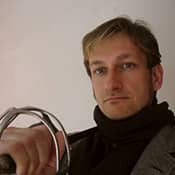Fantasies. We all have 'em. And I'm not talking about the dirty kind.
(Well, okay, the dirty ones too.)
I'm talking about the vast range of human activities aimed at imagining something else.
As a species we have a tremendous wellspring of creativity. We're able to daydream, plan and hope in ways that our fellow animals seemingly can't match. This is a phenomenal power. It's why you can enjoy a book without pictures, use a diagram to build a shed, or create a sweater with nothing but yarn and two needles.
Somewhere along the way we started to use this power to imagine things that aren't. We began to make the diagram without building the shed. To imagine funny monsters made of yarn and the needle-wielding samurai who beheads them.
This is the amazing slope that imagination takes us down: We go from planning, to speculation, to fiction, to something else called fantasy.
I'm going to define fantasy as a type of fiction so unlikely to be true that it actually allows us to forget the truth. You probably know the feeling. It could be a book, a video game, or a piece of art, but at some point you've lost yourself completely in a work of fantasy. And it probably hurt a little to come back.
This power of fantasy to escape reality can be useful. It allows us to entertain ourselves, to relieve stress and to get a break from difficult challenges. It can be a social activity, as with games, or a journey in solitude, as with a book.
But fantasy can also be the dream-killer.
Last time I talked about the heroic life: what it means to live toward the goal of doing great things and changing the world. This is a lifestyle that, by definition, requires action. I think this line said it best:
The heroic life is not what you're already doing... If you think you've reached it, you've already given up on getting there.
In other words, the heroic life is rooted in the idea of striving for more. It's fueled by the insatiable desire to do greater things, the nagging sense that there's more to life than being the best software engineer or volunteering for the PTA. It is founded on a thirst for change, personal development, and making a lasting difference.
I believe that all people have this drive. Many of us lose sight of it as the responsibilities of adulthood pile up. Jobs, debt, and unnecessary obligations vie for attention. Each one convinces us we need it. We are told that we will be bad parents, or poor, or irresponsible, or selfish if we opt out. But that's not true.
Moms can do it. Dads can do it. Families can travel the world freely, and 80-year-olds can too.
Taking action to improve your life doesn't require great wealth—it just requires planning and the courage to try. This doesn't have to mean traveling; it could mean leaving the job you hate to freelance or consult. It could mean resolving your debt. It could mean relocating so that you don't waste hours of your precious, precious life commuting. With some research, some new habits, and less than a year of thoughtful planning you could be on the road to any of these things, a permanent and satisfying life change.
And that's where fantasy kills you.
Fantasy specializes in the quick fix. I don't just mean works of fantasy like Tolkien. I mean all the little fantasies we indulge in. Cosmo magazine, Mr. or Ms. Right, the lottery, games, movies, novels, comics, and maybe-someday dreams. Moments that tell us, "You can imagine the good life even if you can't live it." By turning to these short bursts of imagination to bring joy to our lives, we learn not to actually demand joy.
Anytime you derive your satisfaction primarily from imagined moments rather than the real experiences of your life, you have lost something precious. These things take your time, your money and your will to change. They make you think the depressing parts of your life are okay because they're balanced with exciting pretend moments. It's like taking amphetamines to get through your work day.
Things that are real can act as fantasies too. That retirement dream? Maybe it really will happen when you're 62. Maybe you can have your horse ranch or beach house or whatever when you retire. But from age 20 to 61 it's not real. It's an imaginary fantasy that serves as motivation to do things that aren't your passion. If your financial planning works out and you get your beach house, unless it comes with 40 years of renewed youth to play with, it's probably not worth it.





